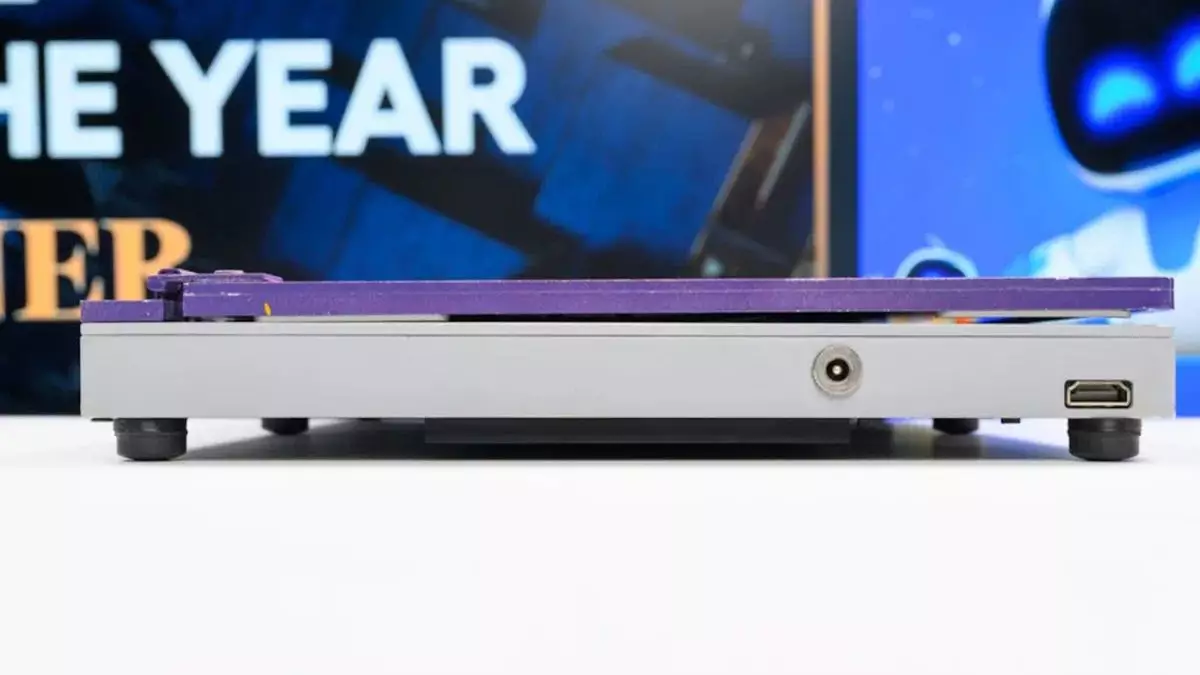In the ever-evolving landscape of gaming, where portability and performance often clash, the launch of the BBook AI Original Edition gaming laptop mod by PenBar has stirred significant interest. It’s a daring venture that challenges our conventional understanding of what a gaming laptop should be. Rather than adhering to the slim and sleek designs that have characterized the market for years, this retro-styled gaming machine stands as a monument to excessiveness in both size and weight. Weighing in at approximately 9.5 pounds (or 4.3 kilograms) and sporting a thickness of over 31 mm, its mere physical presence commands attention and raises questions about its usability.
The design of the BBook AI Original Edition defies modern aesthetics, opting instead for an imposing form reminiscent of bulky electronics from past decades. With a 17-inch display and a full-sized keyboard, the build might evoke nostalgia for some, but for others, it may prompt bewilderment. The inclusion of a 4K IPS panel—bounded by a rather pedestrian 60 Hz refresh rate—shows that while the device is cutting-edge in some respects, it inevitably falls short in others, particularly regarding refresh rates that gamers have come to expect in today’s high-performance laptops. Such choices seem to align more with retro gaming enthusiasts than with individuals who prioritize competitive gaming experiences.
The weight of the BBook AI Original Edition opens a floodgate of deliberations regarding its intended purpose. The heft of this gaming laptop isn’t merely a byproduct of its retro aesthetic; it is symptomatic of the components it houses. In essence, the mod encompasses the internal architecture of a PlayStation 5, which is hardly lightweight in its own right. However, what truly diminishes the ‘laptop’ status of this device is the conspicuous absence of a battery. Essentially transitioning this mod into a stationary console rather than a mobile gaming solution, one must ponder whether it truly lives up to the name “laptop.”
Considering the competitive gaming landscape today, a significant drawback is apparent: portability is king. The lack of an inherent battery shackles users to a wall outlet, often rendering them immobile during gaming sessions. In an era dominated by gamers favoring laptops for their ability to traverse various environments—from a living room to a friend’s house or even to a café—this design choice seemingly contradicts the freedom that gaming laptops traditionally provide.
Another point of concern arises from the acoustic output of the BBook AI. With a reported noise level comparable to that of a hairdryer—71.3 decibels—it presents an environment ill-suited for quiet gaming, particularly in shared spaces. This aspect may lead to contention, especially for those who appreciate immersive gaming experiences where auditory stealth is prized.
In a financial context, the asking price of around $2,748 can also be a sticking point. Although one might expect artisan builds to come with a premium, such a price tag must be justified through superior performance, unique features, or a combination of both. Yet, the BBook AI, with its performance largely mirroring that of existing PlayStation 5 consoles, raises eyebrows as to whether paying nearly $2,800 for a device without battery capability and bulkier design is a worthwhile investment—especially when more conventional options offer superior gaming performance at a similar cost.
Ultimately, the BBook AI Original Edition represents more than just a gaming machine; it is a testament to a unique culture within the gaming community that celebrates excess and individuality. While it sparks curiosity and admiration, it does so amid a whirlwind of contradictions. Is it a functional gaming laptop, or is it merely an extravagant piece of nostalgia? The answer lies not just in performance or portability but in the hearts of those who would be drawn to it. As gaming continues to innovate toward lighter, faster, and more portable solutions, the BBook AI stands as a quirky yet bewildering reminder of an era where aesthetics frequently overshadow the practicalities of gaming hardware.

